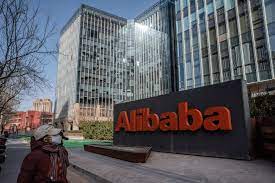The largest restructuring of China’s market leader in online commerce since its founding more than 20 years ago, Alibaba wants to divide its $US220 billion ($329 billion) empire into six units that will each raise money and consider initial public offerings.
The action paves the way for upcoming spinoffs and market debuts by granting the Chinese company’s key divisions—from e-commerce and media to the cloud—much more autonomy. In New York’s pre-market trade, its shares increased by 8%.
The transition to a holding company form is unusual for significant Chinese IT companies and may serve as a model for Alibaba’s competitors. One of Beijing’s main objectives during its extensive crackdown on the technology sector is being addressed by decentralizing the company’s business lines and decision-making authority.
The impact of internet platforms, particularly those run by Tencent, the owner of WeChat, and Alibaba, had drawn criticism from the government. It follows the government regulator who was worried that concentrated dominance in technology was stifling innovation and would likely favor the restructuring. Throughout the years, Alibaba and Tencent have invested in hundreds of businesses, frequently assisting with the development of their strategies.
According to Marvin Chen, a Bloomberg Intelligence analyst, China’s policy to lessen the monopolistic nature of the IT giants is a move in the right direction. Although China tech spinoffs are typical, this move appears to be more comprehensive and includes core operations, which might serve as a model for the sector moving forward.
The statement from Alibaba came on the same day that its billionaire co-founder Jack Ma returned to China after more than a year abroad. Recently, he was seen visiting pals in Melbourne.
It is a change from the internet company’s longstanding predilection for consolidating the majority of its operations under the main Alibaba umbrella, which included everything from supermarkets to data centers. Furthermore, it sends a clear message that Alibaba is prepared to access markets and investors after the Xi Jinping administration’s crackdown on internet spheres destroyed more than US$500 billion of its value.
Daniel Zhang, the group’s CEO, will supervise the cloud intelligence branch, a signal to the expanding role that AI will eventually play in the portfolio of the e-commerce leader. He’ll keep running the main corporation.
Jiang Fan, the head of global commerce, will be in charge of the Taobao Tmall major online shopping division, while Trudy Dai, a seasoned executive, will lead the worldwide digital business section. Local businesses including meal delivery, the Cainiao logistics group, and digital media and entertainment are among its other divisions.
In a statement, Zhang said, “At 24 years old, Alibaba has welcomed a fresh opportunity for growth. Every business group and firm can pursue independent fundraising and IPOs when they are ready, and the market is the best litmus test.
Spinoffs have already been successful for Alibaba. In 2010, it split off Alipay, a contentious decision at the time that nevertheless resulted in the formation of Ant Group Co. When China pulled the plug, the Ma-controlled fintech unit was about to execute the largest IPO in history and has since indicated it would be open to a second attempt.
Alibaba reiterated its commitment to cost-cutting on Tuesday, despite the addition of a half-dozen new business lines. That was a cautious turn for a tech behemoth that had previously spent heavily to control large portions of the economy, indicating the decline in growth since Xi’s crackdown began in 2020.
For the past two years, Beijing has tightened down on the nation’s tech giants, demanding significant adjustments in the business structures of companies like Alibaba. The industry leader in e-commerce is also dealing with increasingly fierce competition from JD.com Inc., its main rival, as well as up-and-comers like PDD Holdings and ByteDance.
Gary Dugan, CEO of the Global CIO Office, stated, “We assume the unique strategy to split up its businesses has had some type of blessing from the authorities. In that situation, it will be viewed as a sophisticated method of releasing the business’s wealth.

















